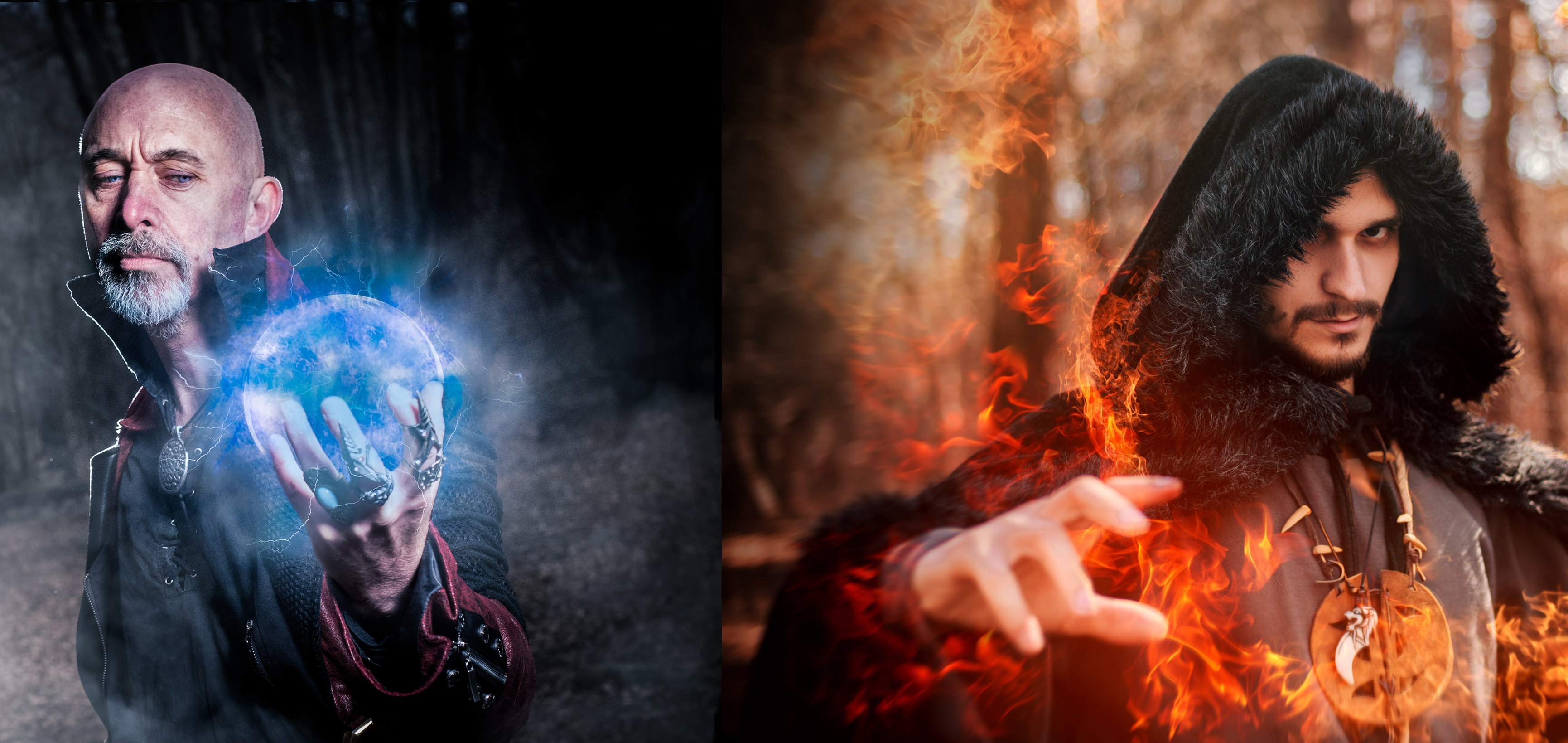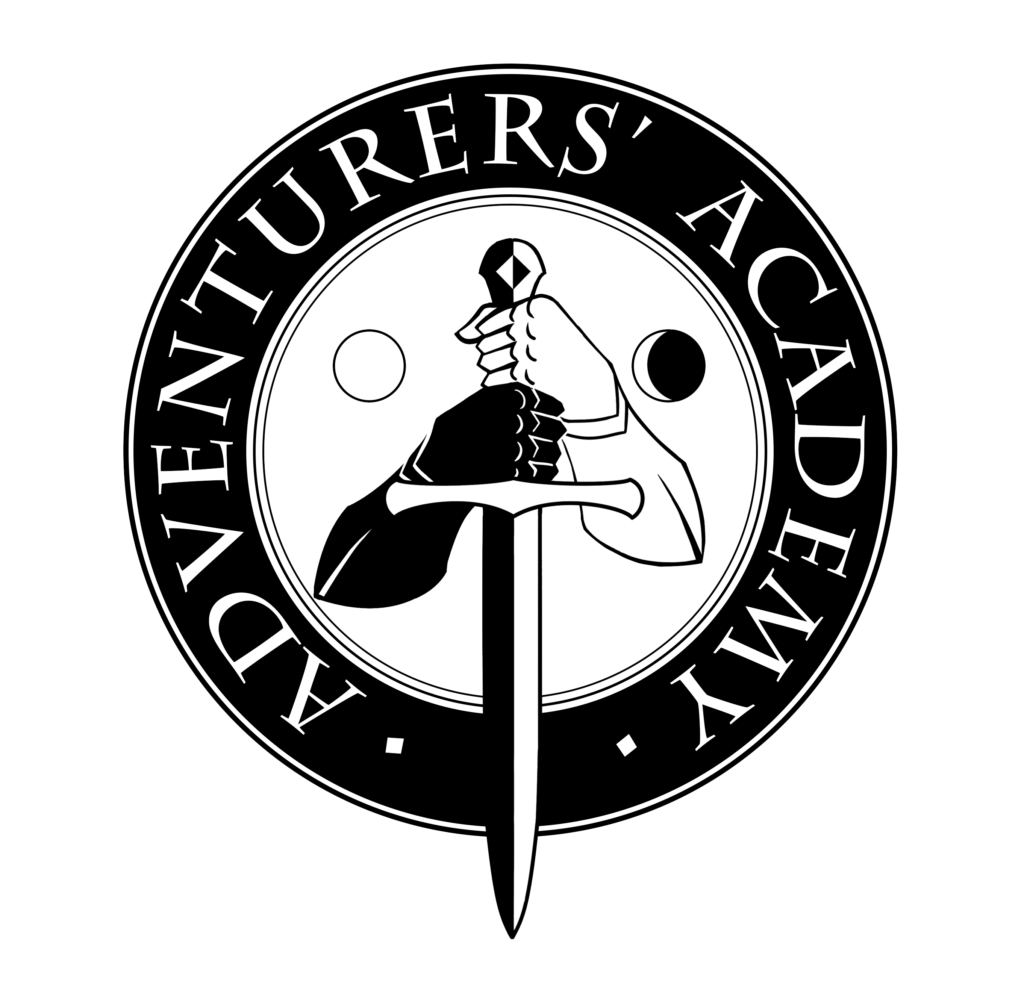What is larp?
Larp (live-action roleplay) is a collaborative storytelling experience where the players embody characters and interact with the game world and with one another in a spontaneous, unscripted way.
Setting
The game is set in a fictional world whose inhabitants are torn between the two warring forces: Creation and Destruction. In exchange for loyalty towards one of the two Alignments, the all-powerful Divinities bestow special powers upon those who serve them. That is how allies of Creation and Destruction are born, blessed with a larger-than-life destiny and burdened with their family’s and nation’s expectations towards the future. As they set off on the journey to greatness, all they have is the favour of their Divinity to trust in and the words of their prophecy to guide them.
Our game starts when all the Chosen Ones meet at the gates to the famous Adventurers’ Academy, the place that will forge them into the heroes and villains they are meant to become.
The journey will be filled with mystery and danger, but also with joy and adventure.
This is, after all, how legends are born.
Tone
Much like the pen-and-paper games it pays tribute to, Adventurers’ Academy combines the light-heartedness of familiar tropes with the occasionally heavier weight of the characters’ journey. The tone will shift from scene to scene, and while a sprint through a monster-infested dungeon may elicit humour, death of a party member definitely should not.
We are going to co-create this experience together, players and crew alike, and we will build it on the following pillars:
1. Sincerity:
we will all do our best to be on the same page as to the tone of the game. None of the tropes are played completely straight or completely satirically, and we will make sure that each character we write has both, space for humour and space for a deeper connection between the character and the player;
2. Collaboration:
we will focus on two playstyles: play-to-lift and play-to-lose, which means being generous towards one another and distributing the spotlight evenly across the board.
Example of play-to-lift: you have won a duel with your enemy, and you want to serve them a one-liner. It would be easy to say something like “Better luck next time, loser”, but imagine saying this instead: “Gotta admit, I broke quite a sweat there. I think I’ve earned myself a drink.” Not only are you acknowledging the challenge posed by your opponent, making them look badass despite their loss, but you also make your own character look cool for having beaten a formidable foe rather than a “loser”.
Example of play-to-lose: you’re enjoying a bardic performance at the tavern when, out of the corner of your eye, you notice an enemy slipping a drop of poison into your drink. You could call them out on it or ostensibly pour the drink out, or do any number of other “winning” moves; but you could also raise your glass in a toast to the performer, take a drink, and play the effects of the poisoning (push through the crowd to the exit and loudly “vomit” outside, pass out on the table, rasp for a healer etc.)You will notice that in both examples, your actions don’t change the tone of the scene, but complement it. Which brings us to pillar number three:
3. Tonal integrity:
we will do our best to read the room and adjust to the tone of the scene. Whether someone is playing for humour or seriousness, they are the tone-setter and we will respect the flow of the scene (or respectfully remove ourselves if the tone isn’t vibing with us at the moment).
Example 1:
You encounter a scene where a group of adventurers discuss escorting a frightened peasant through a dangerous territory. The tone of the scene appears to be serious and the players look engaged and immersed. It’s probably not the best time to burst in and confront the bard about singing rude songs about your underwear.
Example 2:
A group of adventurers is playing a game of “truth or dare” and clearly having a laugh. It’s probably not the best moment – or the best group – to crawl to while covered in blood to tell them about a dark prophecy that will doom them all.
A word on slapstick: there will inevitably be moments of comedy gold. It’s a game which plays on tropes: comedy is inevitable and, in truth, quite welcome. That being said, we’d like to avoid slapstick for the sake of slapstick. Keeping the tone light and turning everything into a joke are two completely different things, and while we support the former (within the tone of a given scene), we say a hard no to the latter. In larp, slapstick is often disruptive, immersion-breaking, and simply annoying. We’re sure we can all enjoy the game without it.
Finally, here’s a rule that encompasses all of the above: be kind and always assume the best intentions in people. We all mean well, and sometimes in our eagerness we misjudge. And that’s okay! Remember that you can always approach people off-game and clarify things. When you do, please do it with an open mind and the assumption that everybody involved had equally good intentions!
Characters
All players are cast as first-year students at the Academy. Having only recently found out that they have a destiny to fulfil, they are summoned to the legendary learning place for future heroes and villains, and they all start at level 1. These are people from all walks of life: kings and beggars; thieves and merchants; young, old, and everything in between. Your character’s background is part of who they are – have as much fun with it as you like!
Professions

Paladins & Vindicators
Representing Creation and Destruction respectively, Paladins and Vindicators are the primary combat-oriented members of their party. They are expected to be tougher than an average Adventurer and naturally charismatic – skills that are priceless when the party faces danger or a diplomatic crisis.
Paladins often take the forefront in dangerous situations, brandishing their sword with pride and basking in divine grace. They are known for dramatic posing and empowering speeches performed in conveniently placed cones of light.
Vindicators also tend to be natural leaders, rallying their allies through dark monologues uttered from the deepest shadows. Their swords strike with ruthlessness rather than honour, and their road to glory is often paved with deception.

Clerics & Mystics
Clerics and Mystics worship the opposite Pantheons, with the former being faithful to Creation and the latter praising Destruction. Due to their blessed nature, they have the unique ability to commune with the Divinities, often receiving mysterious quests and secret tasks whose completion may bring rewards for the entire party.
Clerics are often seen as those who keep the party alive by any means necessary, even if the party is actively sabotaging these efforts – or perhaps especially then. They are known for their diagnostic skills, healing rituals, and a bedside manner which ranges from coddling to downright grumpy.
Mystics are perceived as the inflictors of pain. They know where it hurts the most, and they will channel their divine power to strike exactly there. Their bedside manner is notoriously awful, but they are indispensable in a party that loves to see its enemies suffer.

Rogues & Tricksters
Rogues and Tricksters stand on opposite sides, the former serving Creation, the latter Destruction. They are your specialists on poisons and antidotes, traps and locks, as well as various mechanical and alchemical contraptions.
Rogues have a natural affinity for magical concoctions. They can decipher alchemical formulas and produce antidotes that frequently save their party’s lives. When they aren’t practising medicinal alchemy, they experiment with other concoctions, such as smoke bombs whose fumes impair the enemy’s perception.
Tricksters know their way around poisons, and they’re always happy to test them on the hapless heroes of Creation. The ease with which they handle harmful substances is both impressive and off-putting, and while Tricksters prefer to skulk in the shadows, you’ll know they’re present once you’re enveloped in poisonous gas from one of their contraptions.

Wizards & Warlocks
Wizards and Warlocks stand on opposing sides, the former representing Creation, the latter Destruction. Divine power flows through their veins in the form of raw magic, which they use for very different purposes, depending on their alignment. Those are your party’s treasured spellcasters, and the only people with the ability to attune themselves to their surroundings and sense the magic within them.
Wizards can shield themselves from injury or grant protection to someone else. They are indispensable in parties with high-profile adventurers who are often targeted by the enemy, or on missions where the escorted cargo needs to be protected at all costs. Being able to manipulate the elements or vanish from sight are just some of the skills in their versatile arsenal, which more than makes up for their squishiness in battle.
Warlocks, on the other hand, don’t bother protecting themselves or others from harm. Instead, they respond to injury with injury. Weaving a parasitic bond between themselves and their attacker, they can deal the same damage to the enemy as they suffer themselves. If they are feeling charitable, they can do the same for another party member instead, making it tricky for the enemy to know where to strike without risking an unexpected – and painful – ouchie.

Bards
Bards are astute observers of the world around them. They can serve either Creation or Destruction, drawing inspiration from their party’s heroic deeds or villainous pursuits. Performers by craft and by nature, they come in all varieties. While some favour playing an instrument, others may simply use their voice to sing or chant as their party face off against the opposition; others still are skilled with rhymes and will weave together a poem faster than a sword can be drawn. The Academy teaches them all, regardless of their experience. They are the makers of history, the weavers of tales. No secret is safe with bards, and no deed will go unsung.
Bards of Creation are respected for their prowess with musical instruments and famous for their sharp tongues. Their voice carries influence, and their words can make or break somebody’s good name with a sequence of well-played notes and witty lines. In battle, their inspired performance can boost the party’s morale and help them shake off the effects of the enemy’s manipulation and magic.
Bards of Destruction are the architects of drama and dissonance. They manipulate the world around them with clever verses, weaving stories and spreading rumours. Another person’s misfortune is their greatest inspiration, and they are notorious for spreading doubt and discord among their enemies, making lifelong friends fall out and heroes lose trust in their allies.
Adventuring parties
No hero achieves greatness on their own, and no villain becomes a legend without their entourage. Most people won’t even acknowledge adventurers operating solo. During the game, your character will join an adventuring party, get invested in the personal stories of their peers, make enemies with rival parties, and alliances with like-minded ones. Parties are a great way to recruit talented people with unique skills, and go on quests that offer glory and rewards.
Kin
There are many different folk living in the world; some look and feel different from one another, but share common traits. Whilst some of the kin have different beliefs, skills or weaknesses, none of them an inherently good or evil, none of them are inherently clever or foolish. They represent a diversity of cultures within the realm rather then being distinct races. The kin are perfectly capable of falling in love with one another and breeding together; any children will manifest traits of one kin or another; there are no ‘half’ kin.*
*All kin possess a range of physical traits which can be portrayed as vividly or as subtly as you like. All we ask is to be mindful of real-life cultures and respectful towards sensitive topics which pertain to existing people and their struggles.
Earthkin
Humans, or EARTHKIN have the largest population and can be found all over the world. They are resourceful and quick on their feet, which makes them great improvisers and inventors, but due to their inherent recklessness and an impaired self-preservation instinct, they don’t make the greatest leaders.
Play earthkin to test your creativity, and to explore the theme of finding uniqueness in the ordinary.
Wilderfolk
WILDERFOLK are pointy-eared forest-dwellers who have a strong connection to nature and an inherent resistance to magical effects. Born and raised in forests and open plains, if they stay indoors for prolonged periods of time, their emotional stability deteriorates and their mind becomes prone to manipulation.
Play wilderfolk to explore the theme of freedom vs. constraint, civilisation vs. nature.
Fenfolk
FENFOLK are recognisable by their fish-like traits such as scaly skin, fluorescent patterns, or fin ears. Born and raised around water, they are uniquely attuned to danger and can sense the presence of Blights before the threat comes near. On the downside, they are sceptical towards inventions, and tend to get allergic to potions.
Play fenfolk if you’d like to explore a sense of wariness towards an unfamiliar world.
Nightkin
Equipped with cat-like features, NIGHTKIN have a rich culture centred around nighttime rituals. Unfortunately, this makes them vulnerable to Blights, which have reduced their population to alarmingly small numbers. Thanks to their rituals, however, the nightkin can empower their magical prowess, making them potent wizards and warlocks.
Play nightkin to explore unique social structures centred around trust and rituals.
Ratkin
Perhaps the furthest away from human behaviour are RATKIN, the extremely rare sewer-dwellers who often hide their rodent-like features behind masks or magical concealment. They are rarely seen alone, preferring to live in groups where they look after one another. Ratkin are immune to disease, but vulnerable to poisons, including alcohol.
Play ratkin to explore the theme of otherness and hiding behind masks, literal and proverbial.
Children of the Breach
CHILDREN OF THE BREACH are perhaps the strangest of the kin. With characteristically golden or purple eyes, they are mutants whose bodies have horns, tails, extra limbs, or other anomalies. Due to their origin, they are more vulnerable to divine powers, but their physique makes them naturally resistant to non-magical injuries.
Play a Child of the Breach to explore the theme of being born from a world-shaking calamity, and all its implications.
Adventuring parties
No hero achieves greatness on their own, and no villain becomes a legend without their entourage. Most people won’t even acknowledge Adventurers operating solo. During the game, your character will join an adventuring party, get invested in the personal stories of their peers, make enemies with rival parties and alliances with the like-minded ones. Adventuring parties are a great way to recruit talented people with unique skills, and go on quests that offer glory and rewards!
Character death
During the course of the game, as a result of plot events, your character may lose their life. In such a case, please come see the Organisers and we will tell you what happens next. Character death does not have to mean the end of the game for the player and their character, but it does carry consequences.
A player character cannot kill another player character without the target’s explicit consent. Be aware that murder has consequences not only for the victim, but also for the perpetrator.
At the Academy, unsanctioned murder is strictly forbidden and universally condemned by both Creation and Destruction. Heroes and villains should have more self-respect than to resort to such lowly methods.
